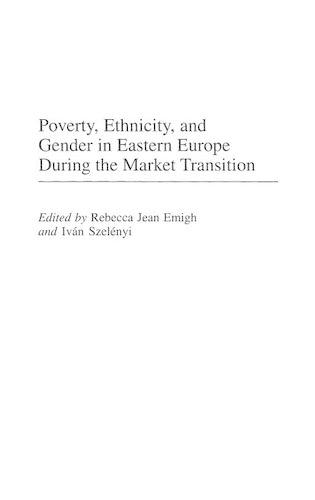
Poverty, Ethnicity, and Gender in Eastern Europe During the Market Transition
(Hardback)
Publishing Details
Poverty, Ethnicity, and Gender in Eastern Europe During the Market Transition
By (Author) Rebecca J. Emigh
By (author) Ivan Szelenyi
Bloomsbury Publishing PLC
Praeger Publishers Inc
30th November 2000
United States
Classifications
Tertiary Education
Non Fiction
Development economics and emerging economies
Regional / International studies
Ethnic studies / Ethnicity
Gender studies, gender groups
362.50947
Physical Properties
Hardback
216
Description
This volume offers an examination of the nature of poverty and its relationship to gender and ethnicity in five post-communist societies. As nations make the difficult transition from socialism to capitalism, the extent and nature of poverty tends to change and, because of this, the proportion of the population living in poverty tends to change. As a result, the proportion of the population living in poverty has increased sharply in these countries. The contributors contend that a "new poverty" is in the making and that the growing underclass is strongly related to ethnicity, as such an underclass is more likely to form if there is a sizeable Roma (Gypsy) minority. The question of whether gender interacts with poverty the same way ethnicity does is the subject of intense controversy and is addressed here. In this analysis of the interaction between poverty, ethnicity and gender in East European transitional societies, the contributors address the relevant issues and relationships and conclude that poverty has become deeper and increasingly long-term in Eastern European nations. Although it is clear that poverty increased in Eastern Europe during the market transition, the extent and nature of the changes have not yet been illuminated. Covering Bulgaria, Hungary, Poland, Romania and Slovakia, the contributors analyze the interaction between poverty, ethnicity and gender in an effort to explain the changing nature of poverty and the formation of an underclass in these countries. Roma (Gypsies) arise as the most likely candidates for membership in the new underclass, as they were always economically disadvantaged and the targets of discriminatory practices. On the other hand however, because they were often better educated than men during socialism, women may have been relatively advantaged, at least temporarily, during the market transition. Thus while poverty may be "racialized" during the transformation, it may not yet be "feminized". In this comparative assessment of social trends in this region, the contributors consider what they mean for the countries where they occur.
Author Bio
Rebecca Jean Emigh is an Assistant Professor of Sociology at UCLA. She has published numerous articles on economic sociology and historical sociology, among other topics. Ivn Szelnyi is William Graham Sumner Professor of Sociology and Professor of Political Science at Yale University. He is author or coauthor of The Intellectuals on the Road to Class Power (1979), Urban Inequalities (1983), Socialist Entrepreneurs (1988), and Making Capitalism Without Capitalists (1998). He has also published numerous papers in leading journals.
